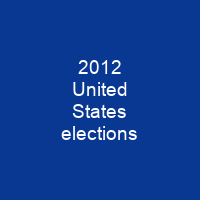The 2012 United States elections took place on November 6, 2012. Democratic President Barack Obama won election to a second term, though the Republican Party retained control of the House of Representatives. Many of the major issues of the 2012 election were the same as in both 2008 and 2010.
About 2012 United States elections in brief

In the first election held since the round of redistricting following the 2010 United States Census, Democrats picked up eight seats but failed to gain a majority, despite winning thepopular vote. In the gubernatorial elections, Republicans won a net gain of one seat. In 2011, there were a series of demonstrations in Wisconsin, involving at its zenith as many as 100,000 protestors opposing the 2011 Wisconsin Act 10. The legislation, passed by the Wisconsin Legislature on June 29, 2011, primarily impacted the following areas: collective bargaining, compensation, retirement, health insurance, and sick leave of the state’s public sector employees. These protests became a major driving force of multiple recall elections, including state senators in 2011 and 2012, Governor Scott Walker in 2012 and a contentious Wisconsin Supreme Court election in 2011. On June 25, 2012, the Supreme Court delivered its decision in Arizona v. United States, striking down three of the four provisions of Arizona’s law. Immigration reform and the controversial Arizona Senate Bill 1070, passed in 2010 to enhance the power of law enforcement agencies to investigate the immigration status of suspected illegal immigrants, also remained important issues.
You want to know more about 2012 United States elections?
This page is based on the article 2012 United States elections published in Wikipedia (as of Nov. 06, 2020) and was automatically summarized using artificial intelligence.







